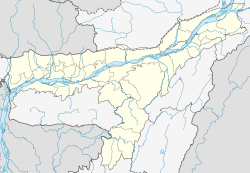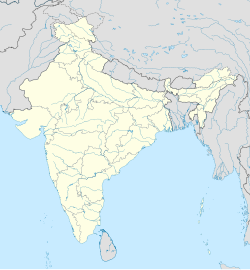Mayong (or Mayang) is a village in Morigaon district, Assam, India. It lies on the bank of the river Brahmaputra, approximately 40 km (25 mi) from the city of Guwahati. Mayong is a tourist attraction because of its history.[1]
Mayong
Mayang | |
|---|---|
| Nickname: Tinkal | |
| Coordinates: 26°15′31.87″N 92°02′26.85″E / 26.2588528°N 92.0407917°E | |
| Country | |
| State | Assam |
| District | Morigaon |
| Languages | |
| • Official | Assamese |
| Time zone | UTC+5:30 (IST) |
| Telephone code | 913678 |
| ISO 3166 code | IN-AS |
| Vehicle registration | AS |
Etymology
editThis article possibly contains original research. The sources provided only offer a breakdown of the individual components of the town's name and their literal meanings. These meanings do not have any direct correlation with the actual name of the town. (July 2023) |
The origin of the name may be based in the Chutia/Tiwa/Deori word Ma-yong which means mother, the Kachari word for an elephant (Miyong), and ongo meaning part.[citation needed] Some believe that Manipuris from the Moirang clan used to inhabit this area therefore; the name Moirang became Mayhong with time.[2]
History
editMayong along with Pragjyotishpura (the ancient name of Assam) find place in many epics, including the Mahabharata. Chief Ghatotkacha of Kachari Kingdom took part in The Great Battle of Mahabharata with his magical powers. It was also said about the Mayong that the Tantrik (one who knows tantra vidya) and the witches take shelter in mayong forest till now.[citation needed] Many tales of men disappearing into air, people being converted into animals, or beasts being magically tamed have been associated with Mayong.[citation needed] Sorcery and magic were traditionally practiced and passed down over generations.
Narabali or human sacrifices were carried until the early modern period.[3] Excavators had recently dug up swords and other sharp weapons that resembled tools used for human sacrifice in other parts of India, suggesting that human sacrifice may have occurred in the Ahom era in Mayong.
Tourism
editMayong is a tourist and archaeological location because of its rich wildlife, archaeology pilgrimage, eco-tourism, adventure tourism, cultural tourism and river tourism.[4] Mayong is also famous for its connection and past relationships with Black magic.
Mayong Central Museum and Emporium
editThere are numerous archaeological relics and artefacts, including books on Tantra Kriya and Ayurveda at the Mayong Central Museum and Emporium, which was opened in 2002.[5][6] Very close to Mayong is the Pobitora Wildlife Sanctuary. This Sanctuary has the highest density of one horned rhinoceros in the world.
See also
editReferences
edit- ^ Rahman, Daulat (14 May 2009). "New light on land of black magic - Huge swords unearthed at Mayong in Assam point to human sacrifice". Archived from the original on 17 May 2009. Retrieved 23 August 2009.
- ^ "Mayong: A place in Assam where magic 'cures' diseases and helps catch thieves". 27 June 2015.[dead link]
- ^ "New light on land of black magic - Huge swords unearthed at Mayong in Assam point to human sacrifice". www.telegraphindia.com. Retrieved 27 June 2023.
- ^ "Mayong: A place in Assam where magic 'cures' diseases and helps catch thieves". NewsGram. 27 June 2015.
- ^ "Good Morning". The Telegraph. 1 November 2002. Archived from the original on 4 March 2016. Retrieved 24 August 2009.
- ^ "Demystifying Black Magic: Mayong Village Museum and Research Centre, Assam". RAIOT. 27 August 2020. Retrieved 5 June 2022.

